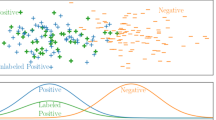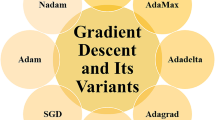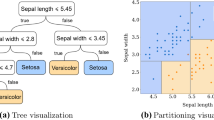Abstract
Nonsystematic search algorithms seem, in general, to be well suited to large-scale problems with many solutions. However, they tend to perform badly for problems with few solutions, and they cannot be used for insoluble problems, since they are incomplete.
Here we present a new algorithm, learn-SAT, that, although based on nonsystematic search, is complete. Completeness is realized through a process of no-good learning, learning-by-merging. This requires exponential space in the worst case. We show, nevertheless, that learn-SAT performs very well on certain SAT problems that are tightly constrained or insoluble. Indeed, its performance generally approximates the best SAT algorithms and does much better at lower clause densities. Learn-SAT also maintains much of the efficient performance of nonsystematic search for large-scale problems with many solutions, at least relative to backtrack search algorithms.
These results indicate that the burden on memory, imposed by no-good learning, is not generally a problem for learn-SAT. This is perhaps surprising in view of previous work. What is even more surprising is the scalability of learn-SAT. For some types of problem it scales very much better than the nearest competitive algorithm. There are other types, however, for which this is not the case.
The performance profile of learn-SAT emerges from an experimental methodology related to the one outlined by Mammen and Hogg in 1997.
Similar content being viewed by others
References
Asahiro, Y., Iwama, K. and E. Miyano: Random generation of test instances with controlled attributes, in Cliques, Colouring and Satisfiability, DIMACS Series in Discrete Math. and Theory Comp. Sci., 1995.
Bayardo, R. J. and Miranker, D.: A complexity analysis of space bounded learning algorithms for the constraint satisfaction problem, in Proceedings AAAI-96, 1996.
Bayardo, R. J. and Schrag R.: Using look-back techniques to solve exceptionally hard SAT instances, in Proceedings CP-96, Cambridge, MA, August, 1996.
Bayardo, R. J. and Schrag, R.: Using CSP look-back techniques to solve real-world SAT instances, in Proceedings AAAI-97, Providence, RI, July, 1997.
Cha, B. and Iwama, K.: Performance test of local search algorithms using new types of random CNF formulas, in Proceedings IJCAI-95, 1995.
Cha, B. and Iwama, K.: Adding new clauses for faster local search, in Proceedings AAAI-96, 1996.
Cheeseman, P., Kanefsky, B. and Taylor, W.: Where the really hard problems are, in Proceedings IJCAI-91, 1991.
Crawford, J.M. and Auton, L. D.: Experimental results on the crossover point in random 3SAT, Artif. Intell. 81 (1996).
Crawford, J. M. and Baker, A. B.: Experimental results on the application of satisfiability algorithms to scheduling problems, in Proceedings AAAI-93, 1993.
Davis, M. and Putnam, H.: A computing procedure for quantification theory, J. ACM (1960).
Dechter, R.: Enhancement schemes for constraint processing: backjumping, learning and cutset decomposition, Artif. Intell. 41 (1990).
Dubois, O. and Boufkhad, Y.: From very hard doubly balanced SAT formulae to easy unbalanced SAT forumlae, variations of the satisfiability threshold, in Proceedings of the DIMACS Workshop on the Satisfiability Problem: Theory and Applications, 1996.
Frost, D. and Dechter, R.: Dead-end driven learning, in Proceedings AAAI-94, 1994.
Ginsberg, M.: Dynamic backtracking, J. Artif. Intell. Res. (1993).
Ginsberg, M. and McAllester, D.: GSAT and dynamic backtracking, in Principles of Knowledge Representation and Reasoning 4th International Conference, 1994.
Golomb, S. and Baumert, L.: Backtrack programming, J. ACM (1965).
Haralick, R. and Elliott, G.: Increasing tree search efficiency for constraint satisfaction problems, Artif. Intell. (1980).
Jiang, Y., Richards, E. T. and Richards, B.: No-good backmarking with min-conflict repair in constraint satisfaction and optimisation, in Proceedings PPCP-94 2nd International Workshop, WA, 1994.
Kondrak, G. and van Beek, P.: A theoretical evaluation of selected backtracking algorithms, in Proceedings IJCAI-95, 1995.
Langley, P.: Systematic and non-systematic search strategies, in Artificial Intelligence and Planning Systems: Proceedings of 1st International Conference, 1992.
Mammen, D. L. and Hogg, T.: A new look at the easy-hard-easy pattern of combinatorial search difficulty, J. Artif. Intell. Res. 6 (1997), 47–66.
Maruyama, F., Minoda, Y., Sawada, S., Takizawa, Y. and Kawato, N.: Solving combinatorial constraint satisfaction and optimization problems using sufficient conditions for constraint violation, in Proceedings ISAI-91 4th International Symposium on AI, 1991.
Minton, S., Johnston, M. D., Phillips, A. B. and Laird, P.: Minimising conflicts: A heuristic repair method for constraint satisfaction and scheduling problems, Artif. Intell. 58 (1992).
Mitchell, D., Selman, B. and Levesque, H.: Hard and easy distributions of SAT problems, in Proceedings AAAI-92, 1992.
Morris, P.: The breakout method for escaping local minima, in Proceedings AAAI-93, 1993.
Nadel, B.: Constraint satisfaction algorithms, Computational Intelligence, 1989.
Papadimitriou, C. and Steiglitz, K.: Combinatorial Optimisation: Algorithms and Complexity, Prentice-Hall Inc., Englewood Cliffs, NJ, 1982.
Prosser, P.: Hybrid algorithms for the constraint satisfaction problem, Comput. Intelligence 9 (1993).
Richards, E. T.: Non-systematic search and no-good learning, Ph.D. Thesis, IC Parc, Imperial College, 1998.
Richards, E. T., Jiang, Y. and Richards, B.: Ng-backmarking-an algorithm for constraint satisfaction, AIP Techniques for Resource Scheduling and Planning, BT Technology J. 13(1) (1995).
Richards, E. T. and Richards, B.: No-good learning for constraint satisfaction, in Proceedings CP-96 Workshop on Constraint Programming Applications, 1996.
Richards, E. T. and Richards, B.: Restart-repair and learning: An empirical study of single solution 3-SAT problems, in Proceedings CP-97 Workshop on the Theory and Practice of Dynamic Constraint Satisfaction, 1997.
Richards, E. T. and Richards, B.: Non-systematic search and learning: An empirical study, in Principles and Practice of Constraint Satisfaction CP-98, 1998.
Schiex, T. and Verfaillie, G.: No-good recording for static and dynamic constraint satisfaction problems, in Proceedings IEEE 5th International Conference on Tools with Artificial Intelligence, 1993.
Schiex, T. and Verfaillie, G.: Stubbornness: A possible enhancement for backjumping and no-good recording, in Proceedings ECAI-94, 1994.
Selman, B., Levesque, H. J. and Mitchell, D. G.: A new method for solving hard satisfiability problems, in Proceedings AAAI-92, 1992.
Selman, B. and Kautz, H.: An empirical study of greedy local search for satisfiability testing, in Proceedings AAAI-93, 1993.
Selman, B. and Kautz, H.: Local search strategies for satisfiability testing, in Proceedings 2nd DIMACS Challenge Workshop, 1993.
Siegel, P.: Representation et utilisation des connaissances en calcul propositionnel, These d'Etat, Groupe d'Intelligence Artificielle, Universite d'Aix-Marseille II, 1987.
Smith, B.: How to solve the Zebra problem, or path consistency the easy way, in Proceedings of ECAI-92, Austria, 1992.
Tsang, E.: Foundations of Constraint Satisfaction, Academic Press, 1993.
Verfaillie, G. and Schiex, T.: Dynamic dacktracking for dynamic constraint satisfaction problems, in Proceedings ECAI-94, 1994.
van Hentenryck, P.: Constraint Satisfaction in Logic Programming, MIT Press, London, 1989.
Yokoo, M.: Weak-commitment search for solving constraint satisfaction problems, in Proceedings AAAI-94, 1994.
Rights and permissions
About this article
Cite this article
Richards, E.T., Richards, B. Nonsystematic Search and No-Good Learning. Journal of Automated Reasoning 24, 483–533 (2000). https://doi.org/10.1023/A:1006362926464
Issue Date:
DOI: https://doi.org/10.1023/A:1006362926464




